
Did you know that 75% of people never scroll past the first page of Google search results? This means if your website is buried on the second or third page, you’re missing out on a huge chunk of potential traffic. You can avoid this by creating and implementing an effective SEO strategy.
Search Engine Optimization (SEO) is an essential aspect of digital marketing. With a robust SEO strategy, you can improve your website’s rankings and reach the first page of search results. If you’re a business owner in Australia, investing in a good SEO strategy can be a game-changer for your business. With the rise of online competition in every industry, attracting new customers to grow your business is crucial. A good SEO strategy can position your business as a leader in your industry and attract a steady stream of targeted traffic to your website.
When it comes to SEO, it’s important to work with professionals with expertise and experience. In Melbourne, there are many SEO agencies and consultants who can help you improve your website’s visibility and attract more organic traffic. However, if you’re looking for a more personalized and flexible approach to SEO, working with a specialist like freelance SEO PSingh could help you come up with a unique plan for your website’s SEO. They can offer customized solutions tailored to your specific needs and goals.
SEO Tips To Help You Grow Your Website’s Traffic
That said, here are some tips that can help you increase your website traffic:
1- Create high-quality, relevant content
Your website’s content is the foundation of your SEO strategy. Hence create informative and engaging content relevant to your target audience. Put yourself in your readers’ shoes. What questions or challenges do they have that your content can help them solve? What do they want to know? What kind of content would be most helpful to them? You’ll build trust and credibility with your readers by addressing their needs and solving their problems.
In addition to being informative and engaging, your content should also be relevant to your target audience. Use language and examples that resonate with them and speak to their interests and concerns.
2- Use keywords strategically
Keywords are words and phrases people use to search for information on the internet. You can improve your website’s visibility on SERPs by incorporating relevant keywords into your content.
Focus on using keywords naturally and organically within your content. Start by doing research to identify the keywords and phrases related to your business or industry. Once you’ve identified your keywords, integrate them into your content in a way that makes sense. A good rule of thumb is to aim for a keyword density of around 1-2% – that is, your target keyword should appear in your content once or twice for every 100 words.
However, it’s crucial to use keywords strategically and avoid keyword stuffing. This tactic can harm your website’s rankings because Google or any other search engine considers this spam.
3- Optimize metadata
Metadata refers to the information used to describe your website’s content and structure, including the title tags, meta descriptions, and header tags. Optimizing it can impact your website’s traffic and visibility in search results. You can provide search engines with important information about your website and its content, which can help crawlers understand what your website is about and rank it better.
So, improve title tags. Your title tag is the main heading that appears in search results; it should accurately describe the content of your page in a way that is both informative and engaging. Moreover, pay attention to your meta descriptions. This is a short review that appears below your title tag in search results, and it should provide a summary of your page’s content in a way that is both informative and compelling.
4- Create backlinks
A backlink is a link from another website to your website, and high-quality backlinks from authoritative websites can help improve your website’s ranking on the internet and traffic.
Backlinks function as an endorsement of your website’s content and authority. When other reputable websites link to your content, it signals to search engines that your website provides valuable and relevant info to users. This can help improve your search engine rankings and make it easier for users to find your website.
5- Optimize website structure
Search engines use complex algorithms to crawl and index websites. Structure your website in a way that makes it easy for search engines to understand and improve your website’s visibility in search results. Here are some tips you can use:
- Use SEO-friendly URLs: Your website’s URLs should be short, descriptive, and easy to read. Avoid using long, complicated URLs with lots of numbers and symbols, as these can be difficult for search engines to crawl and index.
- Use header tags: Header tags structure your content and make it easier to read. Search engines use header tags to understand the hierarchy and importance of your content, so it’s important to use them strategically.
- Optimize your images: Images make your website more engaging and visually appealing, but they can also slow down your website if they’re not optimized. Make sure your images are compressed and optimized for web use, and use descriptive alt tags to help search engines understand what your images are about.
6- Eliminate slow-loading content
If your website takes too long to load, users are likely to become frustrated and leave, which can result in a high bounce rate and reduced traffic over time. Market research by Google stated that if a website takes more than three seconds to load, 53% of mobile users close the site.
Removing slow-loading content from your website can help improve your website’s speed and performance, leading to better user engagement and increased traffic. Use tools to analyze your website’s performance and identify improvement areas. Optimize your images by compressing them to reduce their file size. Minimize the number of plugins you use and make sure they are up to date.
7- Post content consistently
Posting content daily and updating existing content on your website is an effective way to grow traffic over time. Doing so keeps your audience engaged and encourages them to share your content with others, which can help attract new visitors to your website. It also establishes your authority in your niche, which can build trust with your audience and help attract new visitors to your website.
Conclusion:
If you want to increase traffic on your website, investing in a good SEO strategy is one of the smartest decisions to make for your business. Try to implement the tips mentioned above. By providing a positive user experience and staying up-to-date with the latest best practices, you can attract targeted traffic, generate more leads and conversions, and ultimately grow your.
Read More:5 SEO Tips for Start-up Businesses





